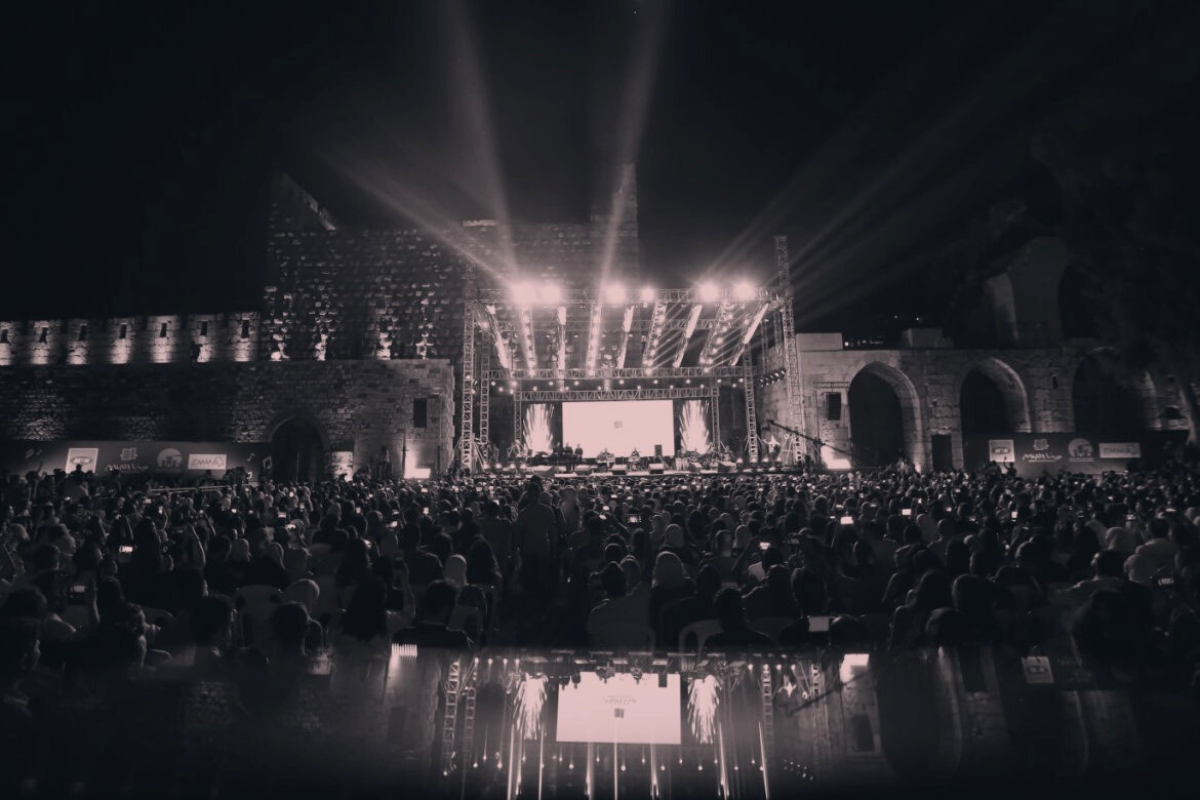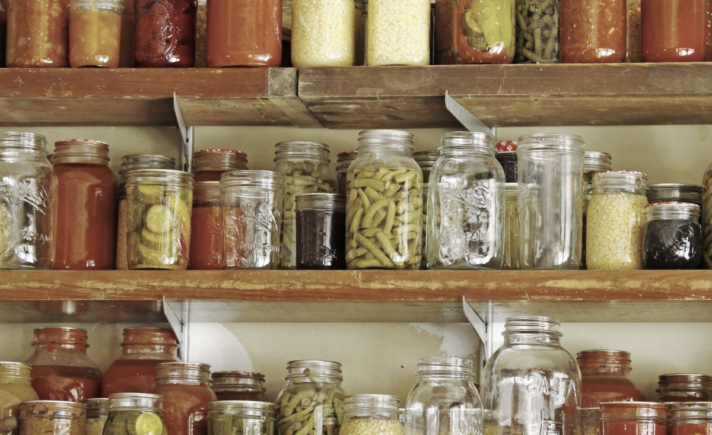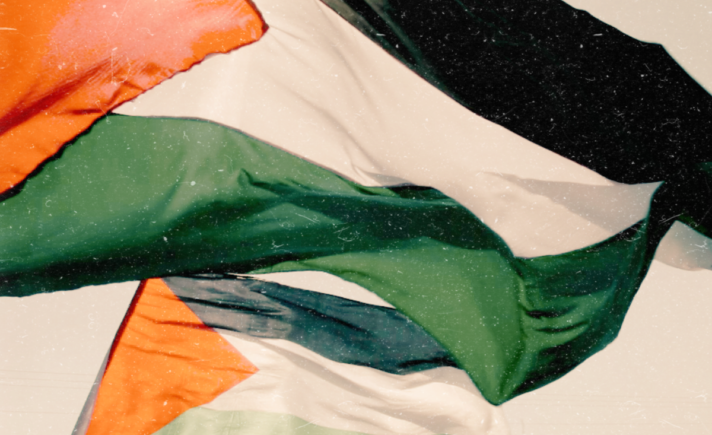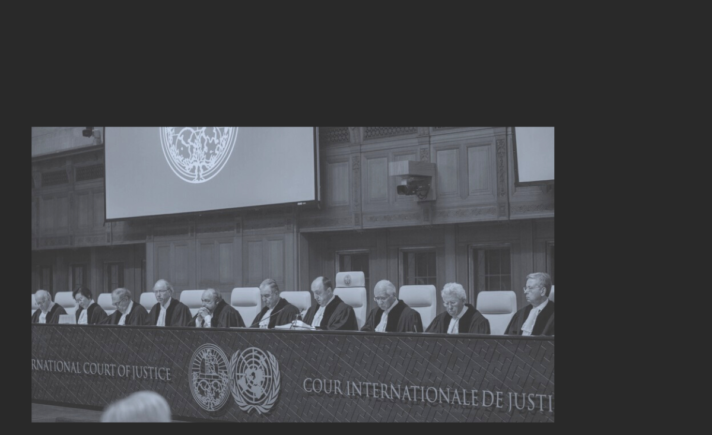Hours before an Israeli missile attack on the outskirts of Damascus, Tunisian artist Saber Rebai concluded the Damascus Citadel Nights festival amid firework celebrations. He did this despite a campaign launched by Syrian regime supporters to cancel the concert, after a photo from 2016 was republished which showed Rebai accompanied by an Israeli officer.
The campaign ended with a lawsuit filed by the Syrian Arab TV presenter, Fatima Jerodiea, three pages of which she used to speak about the perseverance of the army and the leadership (namely, Bashar al-Assad), and included a complaint against the plaintiff, ‘Mina Events’, and everyone who “facilitated and allowed” the committing of this “crime”, as she put it.
The first of the concerts of the fourth session of the Damascus Citadel Nights Festival kicked off on the evening of Wednesday 2nd August, organized by Mina Events, in cooperation with the Ministry of Tourism and the Ministry of Culture in the regime government and Damascus Governorate, and with exclusive sponsorship for the second year in a row from Syriatel, in light of the growing influence of Asma al-Assad, who removed Rami Makhlouf from the communications market and took his place.
The sale of concert tickets coincided with a rapid collapse in the value of the Syrian pound, and thus a fall in the value of the tickets as well. Their prices ranged from 75 to 100 thousand Syrian pounds, depending on the row of seats (roughly equivalent to the monthly salary of a government employee) while the price of a VIP ticket reached 300 thousand Syrian pounds. What was roughly equivalent to 30 US dollars on the night the concert was announced fell to 23 dollars within two weeks.
With less media fanfare, the telecommunications company MTN Syria announced its sponsorship of the Rosa Damas Festival on the grounds of the old Damascus International Fair, organized by Zuma Company in cooperation with Syria Trust for Development: Syrian Handicrafts Ltd.
Unlike the Mina Company, which specializes in cultural events and promotes its concerts through its pages on social media platforms, Zuma Company has no pages on social media sites. Its statute was approved by the Ministry of Internal Trade and Consumer Protection in accordance with Resolution No. /819/ of 2021, and is owned equally by Ibrahim Khalil Zogheibi and Hazem Ahmed Muhammad. The licensing decision says that it has the right to import and export permitted materials, enter tenders and bids, and represent local, Arab and foreign companies and agencies, as well as activity in the software fields and the communications sector.
Tickets to Zuma’s concert were half the price that Mina Events charged for the Damascus Citadel Nights Festival. When it still failed to generate significant interest, MTN announced “buy one get one free” offers on tickets, in addition to offers for free internet packages when people purchased tickets. Performances were planned on two nights: the first, on July 27, by musician Guy Manoukian and singer Maya Diab. However, the latter apologized for not attending mere hours before the concert “due to suffering severe poisoning,” according to a tweet posted on X (previously known as Twitter) – so the first night made do with Manoukian. Melhem Zein sang on the second night, as scheduled.
As for the Castle and Valley Nights Festival in Homs, the people of the valley provided financial and logistical support to establish it and covered all its financial costs and expenses, while calls to advertise it indicated that it was under the sponsorship of the regime Prime Minister, Hussein Arnous, the Homs Governorate, and the Ministry of Tourism. This festival did not escape the consequences of the deteriorating economic conditions either, so the Homs Governorate press office announced its postponement “in view of the current economic conditions that the country is going through, and the wave of fires that a number of Syrian governorates have been exposed to.”
Damascus Citadel Nights Festival: The Sole Survivor
Since the start of the popular movement in Syria, organizing any cultural or artistic event that brings together a large crowd has been considered a difficult and complex operation, as it requires security and government approvals, and attempts often end in failure. For this reason, the cooperation of the Syria Trust for Development (which belongs to Asma al-Assad) in the Rosa Damas Festival seemed logical, and this explains, of course, how Mina Events acquired the Damascus Citadel festival. The latter was owned by Riad Mohammed Nazir Al-Kinayeh, who was head of public relations at the Damascus Arab Capital of Culture festival in 2008, and owns 990 shares in Mina Events (i.e. 99 percent), which has the right to carry out import and export business and work in the field of pledges, investments, buying and selling food, as well as managing restaurants and hotels and organizing weddings and parties. Based on the matching name, it is likely that he is the brother of Lina Mohammed Nazir Al-Kinayeh, Assistant Minister for Presidential Affairs and Head of Asma al-Assad’s Office between 2001 and 2008.
Mina Events was established in 2009, with Ziad Rahbani opening its first festival in the Damascus Citadel. It then returned with another festival in 2010 with Marcel Khalifa, before a break that lasted until 2018: the launch date of the first session of the Damascus Citadel Nights Festival. During previous events, the company relied on bringing in the same singers who have always sung in hotels and restaurants in Damascus, most notably Marwan Khoury, Melhem Zein, and Joseph Attieh. Fares Hazim, the company’s executive director, considered Saber Rebai’s concert the biggest event this year, as he is singing in Syria for the first time in 12 years.
Mina is classified as a “private” company, but it souht to promote the image of a “safe” Syria by attracting singers of different nationalities, even if this cost it huge sums of money in US dollars. This is what explained the absence of Syrian artists during the last session of the festival, despite some of them disapproving strongly. Among them was Wafiq Habib, “the first one to sing for Bashar al-Assad and his army,” who recently announced his role in presenting the idea of the Damascus Citadel Nights Festival with the organizing committee and his willingness to sing for free in any Syrian castle – yet he was not invited to sing. Likewise, the music composer Ari Jan Sarhan expressed his “disappointment at being absent from the Syrian concerts,” despite his attempts to communicate with the concert organizers, the Directorate of Theatres and Music, and the Syrian orchestra.
The foreign artists’ wages remain undisclosed, despite it being perfectly legitimate to ask about them, and last year Hazim relied on blackmailing foreign artists with slogans to reduce their wages: “All the participants in this session preferred, and offered, to make concessions for the sake of this country. I also hope that the rest of the artists, in future projects, will also take into account our situation, and I will not say anything more than this.” Indeed, Saber Rebai stated in the press conference before his concert that he “did not set any conditions, and did not care about the financial and logistical details, and his only concern was being in Syria.”
The regime’s efforts to consolidate the narrative of victory through these festivals were clearly visible, especially with the amount of media fanfare and government coverage these events received. However, in the end, only one festival was relatively successful – and it had a lawsuit brought against it, highlighting the failure of these efforts to achieve their goals.
Types of life in a dead city
As with every event of this kind, social media users were divided over whether these festivals served to strengthen the regime’s narrative of “the return of a safe Syria after the victory over terrorism,” and especially the ethics of paying money to events held in cooperation with two ministries in the regime’s government: Culture and Tourism. Since the beginning of 2016, the Ministry of Tourism has undertaken the task of promoting “belonging, victory, and living life” in Syria by producing short propaganda films and publishing them through the ministry’s Youtube account, in complete contradiction to the reality of conditions in the country.
Others considered festivals an opportunity to make memories and have a good time: for those who could not afford the cost of restaurant and hotel parties, which could reach up to two million Syrian pounds, it was easier to save up for the cost of festival tickets.
I conveyed this question to a group of people around me in Syria to hear their views, and found that their opinions also varied.
Layan is a young woman who feels that she lives in an uninhabitable, “dead country”. Although she did not like the atmosphere and was not thinking of going, she believed that if she went, she would not feel that she was doing anything to benefit the regime. On the contrary, what is important to her is to enjoy the moment: “These celebrations may promote a wonderful, safe Damascus, but who believes the Ministry of Tourism or the Instagram influencers promoting this? This would be like seeing people eating in a restaurant and saying: There you go: safety and security.”
Layan did not neglect to mention the “stars” who felt it acceptable and permissible to perform at such festivals after the wave of normalization with Bashar al-Assad. She stated that “the presence of a star like Saber Rebai means media coverage emphasizing the safe situation. But for me, as a resident of Damascus, this festival is no different from the New Year’s party that is shown on government satellite channels during a power outage.”
Unlike Layan, Saad categorically refused to attend this festival, considering the events to be “not even artistic,” but rather an event for “catharsis.” His main reason for boycotting the festival was that “the organizers, sponsors, and financiers are all authority figures or are complicit with the regime,” as he put it. He added, “This festival was facilitated by the government to somehow reflect acceptance of reality. For me, the ugliest face of humiliation is the one that smiles; this event was organized by the government to rob the people, and personally I do not want to contribute to establishing the idea of acceptance.”
No money for luxuries
Last year, the company organizing the Damascus Citadel Nights Festival confirmed, in every media appearance of one of its members, that the ticket price was affordable for everyone, and ranged between 25 and 35 thousand Syrian pounds, or a quarter of a government employee’s salary at the time. However, Executive Director Firas Hazim appeared this year on the local Melody FM radio station, emphasizing that the ticket price is equivalent to the price of a roast chicken. However, people with limited income, and those who have no resource other than their salary, cannot attend.
Abu Nawwar, a government employee and father of five, commented sarcastically on Hazim’s speech, saying: “When we have enough money for a roast chicken, we’ll buy a roast chicken… songs don’t give you bread!” Abu Nawwar stops talking, then thanks the Lord that his children do not ask to attend this type of festival, and concludes by lamenting their youth.
A ticket to attend an artistic festival for 7 US dollars in the first row is considered one of the cheapest in the world, but out of reach for most Syrians in the current reality. According to reports from many international bodies, including a statement published by the International Committee of the Red Cross, “nearly 90 percent of Syrians today are below the poverty line, and more than 15 million people need humanitarian aid.”
The marketing and advertising campaigns for these celebrations began in Damascus at the start of the summer, through roadside advertisements, social media pages, and radio programs hosting the organizers and coordinators, in addition to promotional messages that reached users of telecommunications companies Syriatel and MTN: “Stars we love, and the special atmosphere of the old Damascus Fair.” “Ready for the biggest artistic event in Syria of 2023?”
More than twenty thousand spectators attended the Damascus Citadel Nights Festival over the course of five nights, and the number of attendees per night ranged from 3,500 to 5,000 people. The most popular concerts were the opening ceremony with Ziad Bourji and Muhammad El Majzoub, and the concerts of Joseph Attieh and Marwan Khoury. Despite all this, a huge segment of Syrians did not care about the event, not out of arrogance or separation from the Syrian reality, but because they were completely immersed in the daily reality of life. When I asked the pharmacist, Nour, about her opinion of the celebrations, she responded with astonishment: “I actually don’t know what this is!”





